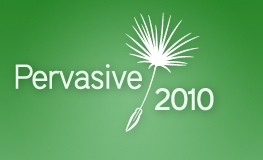[ Download PDF ] [ Visit Workshop Website ]

Pervasive 2010, the 8th International Conference on Pervasive Computing will be held in Helsinki, Finland, 17-20 May.
As workshop chairs for 2010 we have decided the program will be different than in past years as invited projects, invited topics and a call for workshops will all form part of the 2010 program:
- A number of leading and relevant large pan-European FP7 projects have been invited to host a targeted workshop during Pervasive 2010
- Leading research groups have been targeted to develop workshops in areas that have been underrepresented in past Pervasive programs
- A two-phased call for workshop proposals will be made across the research community.
If you would like to be added to the mailing list for this call, please email:
pervasive2010-workshops-list@cs.helsinki.fi
At this stage four targeted groups will be developing workshop programs for 2010. These workshops represent an opportunity for the Pervasive community to reach into new yet related areas while also connecting into large EU funded Pervasive projects.
Up-to-date information about the Pervasive workshops is available at http://www.pervasive2010.org
Workshop Co-Chairs
- Aaron Quigley, University College Dublin, Ireland
- Petteri Nurmi, Helsinki Institute for Information Technology HIIT, Finland
Invited Workshops
Energy Awareness and Conservation through Pervasive Applications
Energy conservation is a growing area of interest for pervasive computing. Recently the problem of conserving energy through involvement of consumers has become topical. The multidisciplinary challenges for pervasive applications are numerous, including pervasive sensing of energy consumption, energy efficient infrastructures for sensing energy and users, and designing engaging applications that do not disrupt but support everyday activities.
This workshop follows a number of previous workshops on sustainability as a general theme at Ubicomp and Pervasive conferences. This is the first workshop focused on energy awareness and conservation that brings together research excellence from Far East (Japan) and Europe.
Organizers
- Adj. Prof. Giulio Jacucci, Helsinki Institute for Information Technology HIIT, Finland
- Prof. Tatsuo Nakajima, Waseda University, Japan
- Prof. Marko Turpeinen, KTH, Sweden
- Prof. Luciano Gamberini, University of Padova, Italy
- Prof. Anna Spagnolli, University of Padova, Italy
Multimodal Location Based Techniques for Extreme Navigation
Location-based data and services for geographical and navigational information (such as electronic maps and GPS directions) are usually presented using visual displays. With the increasing complexity of information, and the variety of contexts of use, it becomes important to consider how other non-visual sensory channels, such as audition and touch, can be used to communicate necessary and timely information to users. Activities such as running, rock-climbing and cycling, are all examples of activities where navigational and geographical information may be needed, but where the visual modality is unsuitable. Additionally, there are a number of user groups such as visually impaired people and the emergency services, who also require non-visual access to geo-data. This workshop will provide a forum for sharing research
ideas and findings about new interaction and perceptualization metaphors, novel application contexts, multimodal and context-aware technologies for mobility – thereby creating a solid foundation for further exploration of pervasive extreme navigation.
Organizers
- Assoc. Prof. Charlotte Magnusson, Lund University, Sweden
- David McGookin, University of Glasgow, United Kingdom
- Margarita Anastassova, CEA, LIST, France
- Wilko Heuten, OFFIS, Germany
- Arantxa Rentería, Robotiker-Tecnalia, Spain
- Prof. Susanne Boll, University of Oldenburg, Germany
Pervasive Personalisation
Personalisation is intrinsic to many of the core goals of pervasive computing. The workshop will address the broad range of issues around pervasive personalisation that is based on an explicit user model. One set of key areas concerns the ways that pervasive computing can inform the content of such a model which may be used in the long term for a range of personalised applications. Another set of important topics concern the ways that the model is used for personalisation within a particular application. Common to both of these are the issues of privacy and security of the user model.
Organizers
- Prof. Judy Kay, University of Sydney, Australia
- Assoc. Prof. Bob Kummerfeld, University of Sydney, Australia
Ubiquitous Virtual Reality
This workshop on Ubiquitous Virtual Reality aims to bring together researchers working in both pervasive computing and mixed reality to explore the convergence on the two domains. Emerging new computing paradigms accelerate the convergence among different technologies and thus make the border between the real and virtual worlds indistinguishable. In addition, mobile (or handheld) devices with integrated sensors have been established as an important platform for both Pervasive Computing and Augmented Reality that have become part of our daily lives. The goals of the workshop are to: (1) better understand the concept of "mobile AR life in dual spaces" (2) identify research issues that are unique to "mobile AR life in dual spaces" (3) aid those developing possible new applications by sharing ideas and designs.
Organizers:
- Prof. Mark Billinghurst, HITLabNZ, New Zealand
- Prof. Woontack Woo, GIST, Republic of Korea
Labels: pervasive, research
